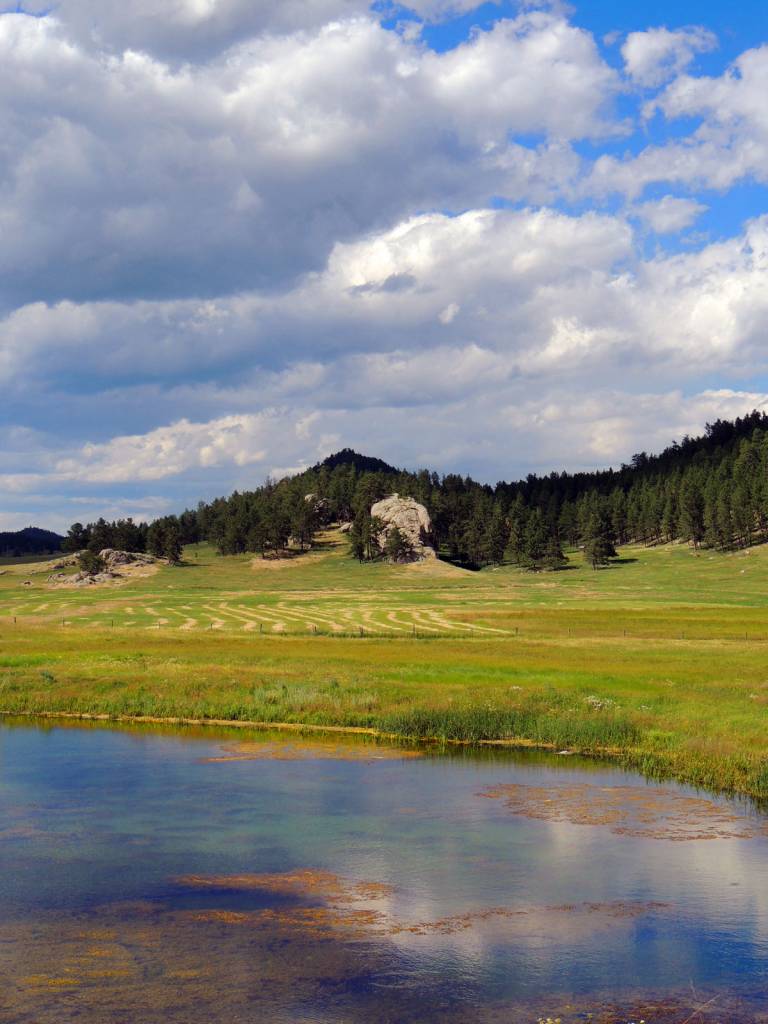Sunday, March 31
This week’s theme: All that is within us
Psalm 103
The Westminster Shorter Catechism, written in the mid-1600s, appears woodenly orthodox through the lens of history. But its first question and answer (edited here for inclusion) provide a beautiful preface for any journey of faith.
Question: What is the chief end of humanity? Answer: Humanity’s chief end is to glorify God, and to enjoy God forever.
How many people in our modern world believe that this is our highest purpose — to glorify our Creator? So far, we have focused on the lavish gifts we receive. Now we concentrate more fully on our response. Let’s continue our Lenten pilgrimage through the poetry of Psalm 103.

▲ Visio Divina — Guided Meditation
Step away from the present moment and allow yourself to be awed by God.
Turn off your cellphone and come to the water.
What is the first thing you see?
Stay on that part of the picture that captured your attention.
Spend a few minutes pondering the image. Take note of what thoughts come to mind.
What are you feeling?
Now gaze at the entire picture.
How is your life glorifying God?
Close your meditation with a prayer of thanks to God.
Monday, April 1
Every fiber
Bless the Lord, O my soul, and all that is within me, bless his holy name. — Psalm 103:1
Somewhere along my spiritual journey, I heard this succinct description: Prayer is paying attention to all of God that we know with all of our selves that we know.
Our conceptions of both God and our own personalities will hopefully grow and expand over time, but this idea captures the heart of our opening verse from Psalm 103. Our journey with Psalm 65 focused on the blessings our Creator showers upon us. We now shift to how we can bless God in return.
Worship is never confined to one hour a week. Through practicing mindfulness, it becomes part of our daily consciousness. This is what Paul meant when he said “pray without ceasing” (1 Thessalonians 5:17). He was not urging us to mumble verbal petitions all day. He meant something closer to what we talk about in the Twelve Steps (edited): “We sought through prayer and meditation to improve our conscious contact with God as we understood God, praying only for knowledge of God’s will for us and the power to carry that out.”
Loving God, tune us to your Presence with every fiber of our beings. Amen.
Tuesday, April 2
Never forget
Bless the Lord, O my soul, and do not forget all his benefits — who forgives all your iniquity, who heals all your diseases, who redeems your life from the pit, who crowns you with steadfast love and mercy. — Psalm 103:2–4
I have heard the testimonies of people who converted from fear-based, works-dominated religions to a newfound spirituality steeped in love and grace. This is a turning from theologies that emphasize the fall of humanity to those that celebrate the essential goodness of Creation.
Goodness? If we have any level of consciousness, we can look around us and easily enumerate the many ills and evils of our world. Racism, classism, violence, pollution, humanity’s inhumanity. But we are called to an undying hope. We are called to a vision of God’s abundance, a resurrection-infused, Spirit-led belief that the arc of history is leading inexorably toward justice, love and wholeness.
This wholeness lies at the heart of God, evident in how our Creator forgives, heals and redeems our lives. Be mindful of these benefits, says Psalm 103. Let them be the source of your daily gratitude and praise, your natural response to life.
Today, God, I will bless you for your healing benefits in my life. Amen.
Wednesday, April 3
Our part in the passion play
The Lord works vindication and justice for all who are oppressed. — Psalm 103:6
In his classic book Celebration of Discipline: The Path to Spiritual Growth, Richard Foster says, “Just as worship begins in holy expectancy, it ends in holy obedience.”
Awareness creates obedience in many ways. We become finely attuned to those attitudes of heart and mind that need correction within us. We also see the world with new eyes, more clearly recognizing human intolerance. We see how the political and economic systems in which we live cause suffering and division. And, hopefully, we seek to bring about vindication and justice after the model of our Creator. Mindful obedience must lead to our part in the passion of Christ, our own role in working for the justice of those who are oppressed.
However, mindful people work for justice from a center of love and peace — the grace of the cross, the passive political resistance of Gandhi, the nonviolence of Dorothy Day or Martin Luther King Jr. Without this core conversion, we do not glorify the God of unity, but simply add our confusion to the Babel that surrounds us. We become the noisy gongs mentioned by Paul.
God, as I work for justice, help me sow seeds of peace that truly last. Amen.

Thursday, April 4
Abounding in love
The Lord is merciful and gracious, slow to anger and abounding in steadfast love. — Psalm 103:8
Mindfulness increases our awareness of the thoughts that swarm through us. Various theories try to quantify these brainwaves, with figures ranging up to 60,000 a day. That is a lot of traffic within our skulls. No wonder there is so much confusion in our world.
Between every one of these notions is a gap of stillness, a place where we realize our God-given ability to choose. Choice is paramount, and we have a Divine model to follow. This classic verse from Psalm 103 describes God in a way that defied the capricious, wrathful deities surrounding the Israelites in ancient Palestine. The God of Abraham, Isaac and Jacob is merciful, gracious, slow to anger, abounding in love.
When we look at how human beings treat the planet and each other, this graciousness doesn’t seem warranted. God showers it upon us nonetheless, a grace that culminates in the petition of Jesus as he hung on the cross: “Father, forgive them, for they know not what they do.”
God calls us to model graciousness with others, so that we will glorify the model of our Creator.
O God, help us choose to act mercifully and graciously today. Amen.
Friday, April 5
Dust to dust
For he knows how we were made; he remembers that we are dust. — Psalm 103:14
Of the many poetic reminders of our mortality, verses 14–16 of Psalm 103 are some of the most poignant. In the first, David says that God’s forbearance toward us is rooted in a recognition that we are made of dust.
How does this concept change our worshipful response to others? The great commentator of yesteryear William Barclay gave a stirring image when speaking of the 10 lepers that Jesus healed in Luke. They were both Jew and Samaritan, natural enemies traveling together because of their shared condition.
Barclay said, “If floodwater surges over a piece of country and the wild animals gather for safety on some little bit of higher ground, you will find standing peacefully together animals who are natural enemies, who at any other time would do their best to kill each other. Shouldn’t it be the same for all of us in our common need for God, seeking the high ground of his presence?”
Mindful people realize that our shared humanity binds us together despite artificial barriers of class, race and nationalism. We respond by seeking unity.
O God, as we ponder our mortality, increase our compassion for all people. Amen.

Saturday, April 6
Gone with the wind
As for mortals, their days are like grass; they flourish like a flower of the field; for the wind passes over it, and it is gone . . . — Psalm 103:15–16
I have a fascination with cemeteries. When I visit new cities, I often wander through their graveyards — from the elegant statuary of New Orleans, to the old graveyard of San Juan, to humble places of rest in the Texas countryside.
Recently, I came across a weathered headstone covered in lichen. I could barely read the inscription: Infant Child of Mr. & Mrs. A. G. Haab, Born and Died, January 2, 1920, Only sleeping . . .
Unnamed child of God, you never knew the seasons of this life. You never loved, laughed or grieved. You never smelled a flower or lifted your face to the sunlight. You never wrestled with the questions of existence. And yet, your headstone cries out to each of us: Remember death, and through its portal, savor each moment of life!
I lay a rose at the headstone of baby Haab, then walked from the cemetery. A cloud blown by the wind raced across the sun.
Loving God, as we become acutely aware of our short lives, let us glorify you and love others with all that is within us. Amen.